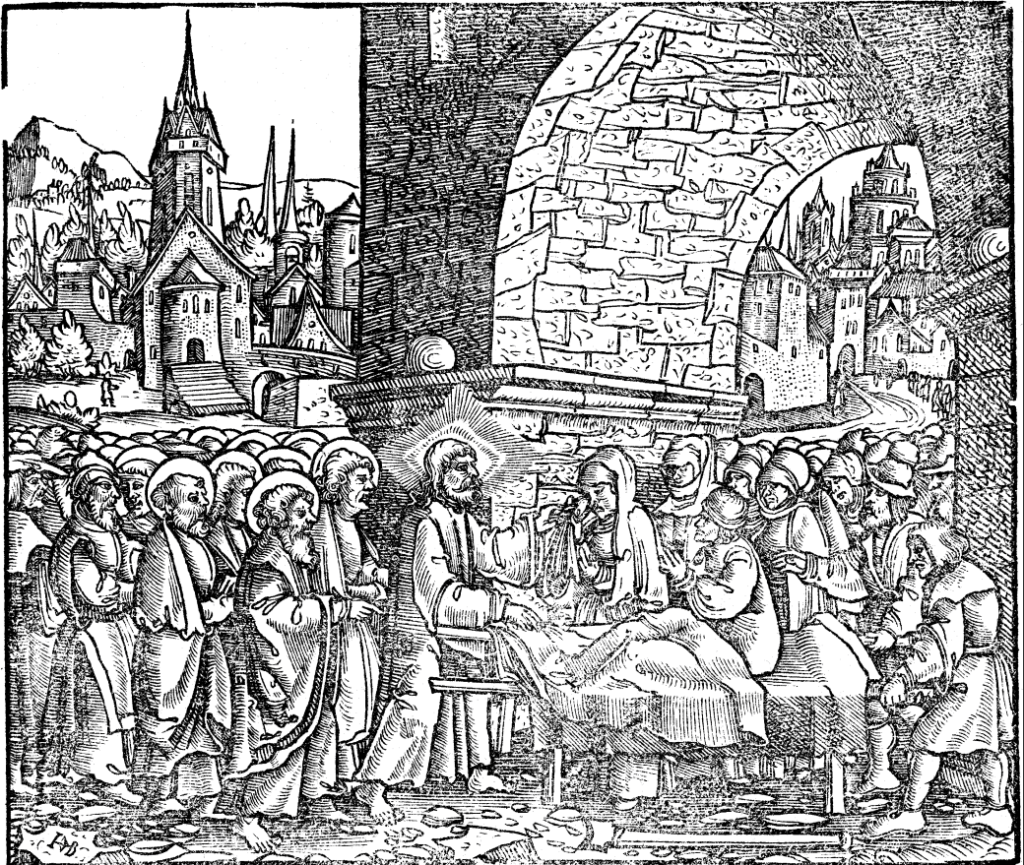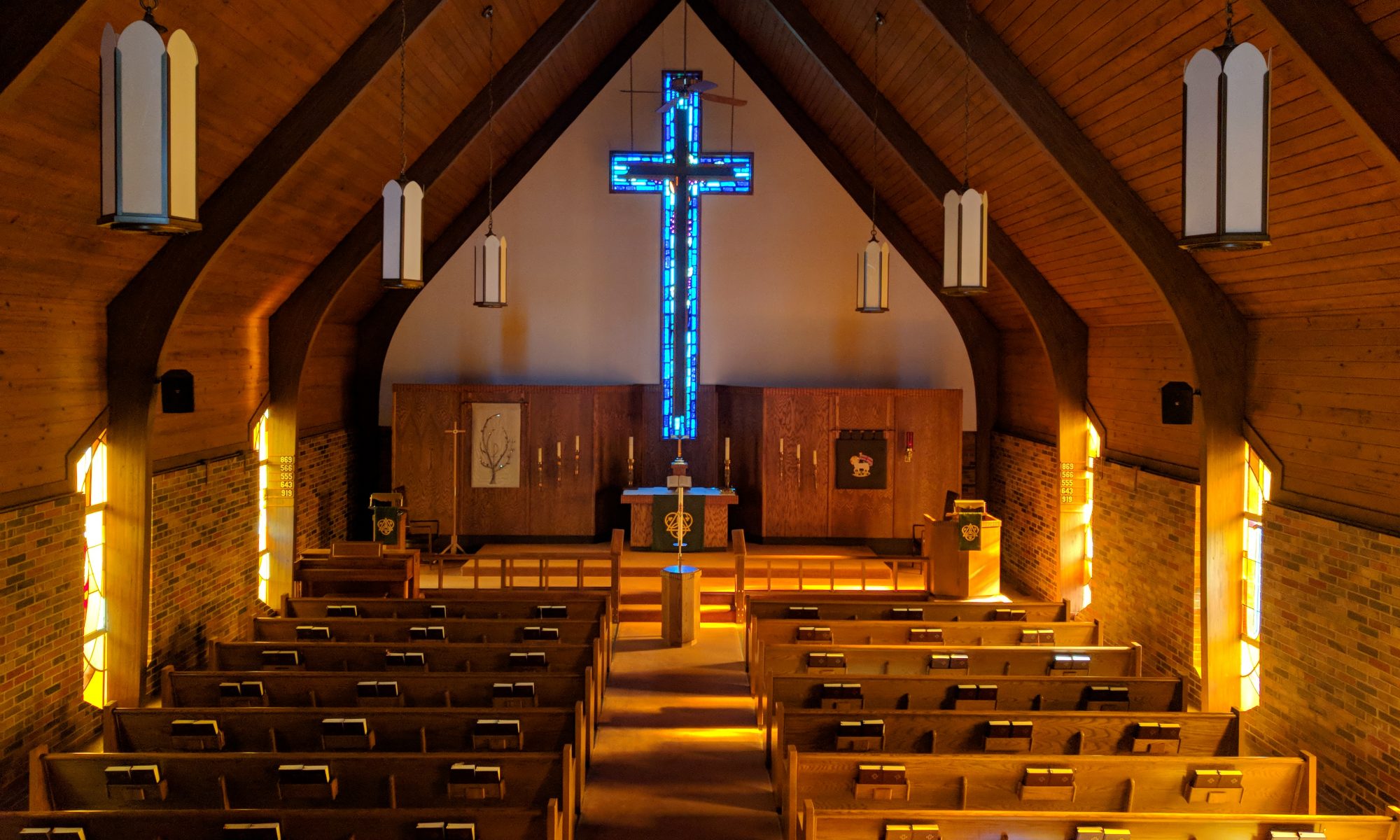
Lessons: 1 Kings 17:17-24, Ephesians 3:13-21, Luke 7:11-17
Hymns: LSB 487, 758, 633, 708, 464
Grace, mercy, and peace to you from God our Father and our Lord and Savior, Jesus Christ. Amen
Easter was nearly six months ago, and today we’re singing some Easter hymns! While Sundays are always a celebration of the Resurrection of our Lord, today’s Gospel acutely brings us back to Easter joy, which is fitting, given that last week Jesus taught us not to be anxious, for our Lord knows what things we need to support our lives. Today’s stunning miracle teaches why we need not worry, for Jesus is the Lord of life and has swallowed up death in victory. This short account is rich, but there is only so much that can be covered in a single sermon. It is my prayer that you will be edified and comforted as you hear how Christ truly fulfills His promise that He will take care of all of us to the point that we need not be anxious.
By this point in our Lord’s ministry, Jesus had performed all the miracles that would be expected of the coming Messiah, except for one. Jesus was anointed as the Anointed One in His Baptism. He fasted for 40 days and 40 nights and withstood the temptations of Satan. He preached the Word with authority. He healed many people of various ailments and illnesses. He cast out unclean spirits, forgave sins, and appointed twelve men as Apostles.
There is one thing that is lacking to confirm Jesus as the promised Messiah: raising the dead, something God did through Elijah hundreds of years earlier.
And so, Luke reports that the day after Jesus healed the Centurion’s servant at Capernaum, Jesus drew near to a city called Nain—a word that mean beautiful. The town is in a lush valley, by the foot of a mountain called Little Hermon (where Jesus may have preached His Sermon on the Mount—the very words we heard last week as Jesus taught us not to worry). A few miles to the west stands Mt Tabor, rising 1600 feet (where Jesus may have been transfigured).
Despite the beauty of this little town, something common to all places lingered among them—a stench—a sorrow—for it was still the valley of the shadow of death.
Even with all the advancements in medicine in our day, death still reigns. While life expectancy has risen in places where people enjoy good nutrition and excellent healthcare, death still comes to all people. Death does not ignore the wealthy, the famous, or the strong. With sin comes death. And all have sinned and have fallen short of the glory of God (Romans 3:23).
Death often seems unfair. Those who experience sudden death have their lives shortened and they leave behind grieving loved ones who did not get to say goodbye. Death hits young and old. In today’s Gospel, the mother was already widowed and now her only son is also dead, adding insult to injury. Thankfully she didn’t live in India or Scandinavia at the time, for those cultures burned widows, deeming them as less than human for they had no man as their head. Those practices ended with Christianity’s influence over a millennia ago in Scandinavia and in 1829 in India when Britain banned it, also thanks to the influence of Christianity.
Yet, this widow suffered in the sense that there was no longer a head in her household. With her husband dead and now her son (who would have carried on the mantle of being the head), she had lost all rights and status in society. She was not alone, however. A crowd was with her as they were going out of the beautiful hamlet of Nain. They were grieving with her. They had compassion on her.
Instead of viewing widows as worthless as many ancient cultures did, through Christianity, widows now are seen to have value. The Bible instructs Christians to care for widows. And God has charged widows with a very important task: to pray (1 Tim. 5:3-5).
Jesus serves as the example par excellence when He approaches this grieving widow. He has compassion on her. And His compassion does not amount to a few empty words, such as, “Don’t worry, be happy.” Instead, His compassion leads to action. Jesus speaks, saying, “Do not weep,” for He is about to raise her son from the dead. He knew her tears of sorrow will be turned to joy. Jesus then stops the procession and touches the open coffin. Normally, this would result in a person being defiled for touching a body (Numbers 5:2). But instead, Jesus, who is holy, cleanses the body of death. For Jesus speaks and it is done. He declares, “Young man, I say to you, arise” and the dead man sat up and began to speak. He did not rise as some sort of zombie, but he truly rose bodily from the dead. His body and soul were reunited. His heart began beating. His voice returned. He truly lived.
At this, Jesus is confirmed as the Messiah. The people rightly testified, “God has visited His people.” They rightly acknowledged Jesus as God. And St. Luke, for the first time in his Gospel, calls Jesus Lord. It is written, “When the Lord saw her, He had compassion on her” (Luke 7:13). Only God can do such great things. He made the deaf hear and the mute speak. He turns our hearts of stone into hearts of living faith. He can even raise the dead.
This resurrection at Nain demonstrates that Jesus is truly Lord and God. His work reveals that He is the greatest of the prophets.
All of us are subject to death. We are powerless over it. We can fight it all we want and we can do whatever possible to make ourselves feel or look young, but death is not something we can stop. Yet, Jesus stopped death in its tracks, not only by raising this young man from the dead, but also by rising from the dead Himself.
Even Jesus was subject to death. Not because of His own sin, for He was without sin. Instead, the “Lord laid on Him the iniquity of us all” (Isaiah 53:6). Jesus became our sin and was held accountable for our sin. The wages we deserve for our sin was placed on Jesus. He was sentenced to death on the cross. He was held guilty in our place. He died to release us of our captivity to sin, death, and Satan
Yet, the grave could not contain the One who was accountable for the world’s sin. The weight of sin and the sting of crucifixion could not keep our Lord Jesus Christ in the tomb. Conquering Satan, swallowing up death, and taking away the sin of the world, Jesus rose victoriously from the grave. The battle has been won and victory has been earned by our Lord Jesus Christ.
All that unfairness about death? Death is what we deserve for our sin. Jesus did not deserve to die. However, we deserve to die not just physically, but eternally, for our many sins. Yet, because Jesus has taken our sin away, we no longer live with the burden of facing eternal death. We are redeemed as God’s own children; therefore, we will live. When we breathe our last and enter the sweet sleep of death, our souls continue to live. They join our Lord and God in the land of the living. They are received in the gates of Paradise.
And when Jesus returns, our bodies will be raised. We will be raised as perfect humans. Our bodies and souls will be reunited. We will live eternally with our Lord, who will recreate the heavens and the Earth. There will be no more sting to death. In fact, there will be no more death. Change and decay will not be all around. The New Creation will be glorious, and we look forward to that day.
And so, we carry on in this life in complete confidence that as Christ lives, so shall we. We live in confidence that Christ, who has power over death, will grant us everlasting life, for He forgives us and covers us with His very righteousness.
Truly the life of the world to come will be the fulfillment of Nain. As beautiful as the lush countryside of Nain was with mountains nearby, the recreated and perfect Earth will be even more beautiful.
Our lives here remain full of pain and suffering. Death looms over us. But we no longer look at death as a great and final enemy. Instead, we know death serves as an entrance to Paradise. God receives us into His everlasting kingdom. Jesus accompanies every funeral march, having compassion on all who grieve and call upon His name.
So while we grieve the death of loved ones, we also look forward to the blessed day of the Resurrection in which our bodies will be made perfect and we will all live together in harmony. Sin will not be wrecking things. And while we grieve, we know that the time of our separation is temporary and our time of our being together will be eternal.
For this, we do as the people did when Jesus presented the widow’s son back to his mother. They glorified God. Today, God is glorified when we submit to His Word. God is glorified when we sing praises in His name, both here in the Divine Service and in our daily lives. God is glorified when we gather around Christ’s gifts, baptizing our children, and receiving the Body and Blood of Christ. God is glorified when we realize that time is not our own and we give this hour at the beginning of the week to our Lord, who gives us so much more in return. God is glorified as we learn not to be anxious, but to commend all things to Christ, who is our Head and has charge of all things.
Last week, we heard Jesus teach us not to be filled with worry or anxiety as He preached His Sermon on the Mount. He taught us to seek first the Kingdom of God and His righteousness, and all the needs of this life will be granted to us. This week, we hear why we can be so confident those words of Jesus. Even death is subject to Him. He is the victor, who grants us the victory. Jesus is now our Brother, who has compassion on us and takes care of all our needs. Thanks be to God. Amen.
The peace of God which passes all understanding keep your hearts and minds in Christ Jesus to life everlasting. Amen

